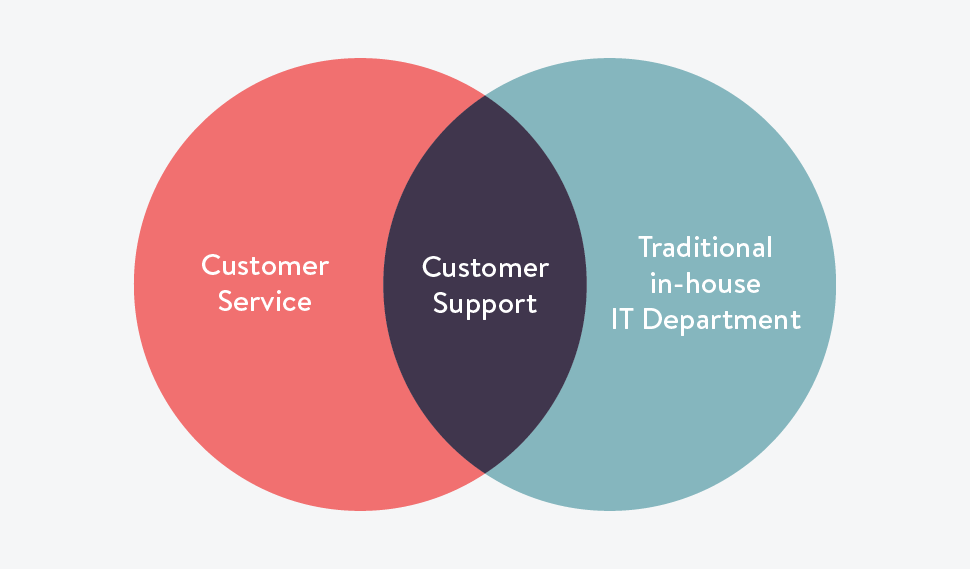The term ‘customer service’ evokes nostalgia for sales clerks in long aprons in country town emporiums. Some see it as the old-fashioned version of customer support. Many people can’t distinguish between terms ‘customer support’ and ‘customer service’. It’s confusing!
Some businesses have rejected the term ‘customer service’ – in a bid to modernize an existing department – in favor of ‘customer support’ which sounds contemporary or even call it ‘customer success’.
But businesses may be looking at naming conventions from the wrong perspective.
‘Customer support’ appears cooler because it has been popularized by new technologies and software.
This can be understood in the context of SaaS (software as a service) and other tech companies. Customer support best describes teams dedicated to supporting customers with products and services that need ongoing technical support.
But customer service takes a comprehensive view of your customer interactions. This ranges from how your sales team onboards new customers through to how your finance team deals with payment problems.
SaaS companies and support teams
To understand the difference between customer support and customer service, it helps to know a little bit about the history of SaaS. The rise in the popularity and viability of cloud-based software has created a greater need for external technical support teams in business.
Traditional IT companies installed their software on site with the customer’s dedicated IT team managing the process. They were also the intermediary between the customer’s company and the supplier in case of problems. This software model has high costs with the need to maintain an IT team and buy enterprise products.
SaaS companies are different because their products or services are cloud-based. And they outsource the traditional model of in-house IT support. Considering computers weren’t common in offices before the 1970s, IT teams haven’t been around long anyway.
In the SaaS model, customers liaise directly with their suppliers. As a SaaS support agent, you are likely to be dealing with non-IT staff such as marketers, administrators or customer service employees.
If you own a SaaS company, your customer support team has taken on the role of a traditional in-house IT department.

Why we confuse support and service
In spite of the differences, the terms ‘customer service’ and ‘customer support’ are frequently used interchangeably. Even Google does not recognize the distinction. It treats customer support and customer service as the same keyword string. Type in ‘customer support’ and you will get results for ‘customer service’.
Some people are highly sensitive about the need to distinguish between the two terms. It’s easy to suggest that one is better than the other. You will hear customer support described as being proactive and empowered, while customer service is cost-centered and dead-end work.
Humans like to rank concepts in a hierarchy. In reality, customer support and customer service are equal but different. It is more useful to consider why businesses still find both terms useful.
Some companies who are not selling SaaS products may prefer the term ‘customer service’ for their operations. It’s accurate because it refers to the company’s interactions with their customers and their business goal of giving them value for their time and money.
SaaS companies have a unique need to build an ongoing relationship with their customers to help them use their products effectively. They may prefer to call their team ‘customer support’ as this name more properly captures their role as outsourced IT support.
People start to disagree when they mix unrelated concepts. All businesses have an element of customer service but not all need customer support. So, we can’t say that customer support has replaced customer service, or that they are even referring to the same set of operations in business.
Can a definition or job title affect your career?
Knowing the difference between customer support and customer service can make a big difference when choosing types of roles you apply in your career.
If you want to build a career as a support agent, then look out for roles that emphasize experience with technical support and perhaps even need software skills. Your ability to get on board with the engineers, and understand the finer details of a product, will be paramount.
Customer support teams focus on helping customers achieve their business objectives. You must know how your customers are using your software in their working lives and be able to troubleshoot for them. You’ll also need to develop your understanding of the businesses that use your software.
If, you want to be a customer service representative you won’t need a deep knowledge of external business processes. Your focus will be on the interactions that customers have with your employer and aiming to fulfill their needs.
You’ll pay less attention to the technical aspects of products and more on providing value for customers in all areas of their interactions with the business.
To develop professionally, take inspiration from all kinds of companies that prioritize their customers’ happiness and make their buying experience a rewarding one.
Not forgetting customer success
The race for businesses to become customer-centric adds extra scrutiny to these terms. A similar debate rages around customer success versus customer service, and what these terms mean in relation to one another.
The answer: all teams should work together with the same goal, to fulfill the needs of your customer. Team names should reflect customer priorities rather than internal ones.
Whatever you call your customer-facing team, the term customer service will always have meaning. It captures the entire set of processes relating to the interactions between your customers and your company with an intention to give your customers value for their investment in your products or services.
Remembering what’s important
Choosing the term customer support or customer service depends on whether your company sells SaaS products that need support, or finite purchases. It’s important to differentiate, not to decide if one name is superior, but to make smarter choices for the business.
The term customer service can be a hindrance if businesses use it to dismiss important processes. Many companies are guilty of placing the entire burden of fulfilling their customers’ needs on frontline employees. This must be a top-level priority for the whole business.
Names matter but investing in your customer-facing teams will always be important.
